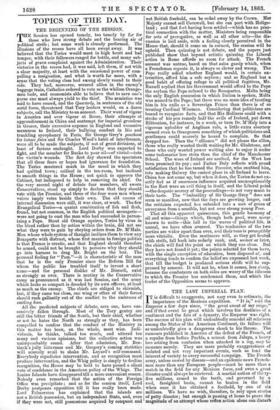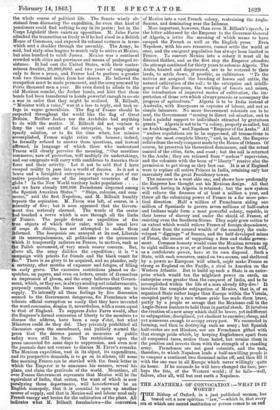THE LIST IMPERIAL . PLAN.
IT is difficult to exaggerate, not easy even to estimate, the importance of the Mexican expedition. "It is," said the Emperor a few days since, "the great event of my reign," and if that event be great which involves the destinies of. a continent and the fate of a dynasty, the Emperor was right. The success of his plan will undoubtedly remodel all relations among the States of the American Continent, its failure will as undoubtedly give a dangerous shock to his throne. The rumours published in America of the defeat of the French, of a repulse from before Puebla, a retreat from Jalapa, a heavy loss arising from confusion when attacked in a fog, may be rumours merely. They are more probably exaggerations of isolated and not very important events, such as lend the interest of variety to every successful campaign. The French army, unless cowed by disease—and an epidemic cows French- men more than any European people—must be more than a match in the field for any Mexican force, and even a great disaster could always be retrieved. A martial nation of thirty- five millions, armed to the teeth, and governed by a cool, farsighted brain, cannot be beaten in the field when once it has obtained a foothold, by one of six millions. We have no wish, therefore, to rely upon stories of petty disaster; but enough is passing at home to prove the magnitude of an attempt whose reflex action alone can disturb the whole course of political life. The Senate wisely ab- stained from discussing the expedition, for even that knot of pensioners could find nothing to say in its praise; but in the Corps Legislatif there exists an opposition. M. Jules Fevre attacked the transaction as freely as if he had stood in a British House of Commons, and exposed its colossal vastness in terms 'which sent a shudder through the assembly. The Army, he said, had sixty-nine leagues to march only to arrive at Mexico, but nine hundred to catch Juarez. Mexico was a continent crowded with cities and provinces and means of prolonged re- sistance. It had cost the United States, with their conter- minous frontier, 20,000,0001. and two years of campaigning only to force a peace, and France had to perform a greater task two thousand miles from her shores. He believed the occupation must be made permanent, and the army renewed by thirty thousand men a year. He even dared to allude to the old Mexican scandal, the Jecker bonds, and hint that those bonds had been transferred to hands powerful enough to create a war in order that they might be realized. M. Billault, "Minister with a voice," was at a loss to reply, and took re- fuge in vague generalities. The flag of France should be respected throughout the world like the flag of Great Britain. Neither Jecker nor the Archduke had anything to do with the matter. M. Billault did not venture to deny the vast extent of the enterprise, to speak of a speedy solution, or to fix the time when, her mission accomplished, France might retire with honour; indeed, he formally refused to answer those questions, and instead affirmed, in language of which those who understand France will clearly perceive the meaning, "Our maritime commerce, sure of protection, will multiply its undertakings, and our emigrants will carry with confidence to America their force and their activity. Let it not be said that I have escaped reality to pass into a world of dreams. Is it not a brave and a farsighted enterprise to open to a part of our native population one of the important countries of the globe ? In the New World territory lacks population . . . and we have already 100,000 Frenchmen dispersed among the Spanish American States." "Ships, colonies, and com- merce," said the first Napoleon, and M. Billault humbly repeats the aspiration. M. Fevre was left, of course, in a minority of five ; but it soon appeared that the Govern- ment was seriously alarmed. The words of the orator had touched a nerve which is sore through all the limbs of France. The people detest an expedition of the true objects of which their ruler, with his usual love of coups de theatre, has not attempted to make them informed. The bourgeoisie are annoyed at its cost, Liberals at its unscrupulousness, all politicians at the quiescence which it temporarily enforces on France, in matters, such as the Polish movement, of very much nearer concern. But, above all, the army dislikes the expedition; it is "a campaign with priests for friends and the black vomit for foe." There is no glory to be acquired, and no plunder, only a certainty, after months of exposure and fatigue, of filling an early grave. The excessive restrictions placed on de- spat,ches, on papers, and even on letters, create of themselves an impression of gloom, and the army believes that Govern. meat, which, as they see, is always sending out reinforcements, purposely conceals the losses those reinforcements are to supply. To intensify all these feelings by free discussion seemed to the Government dangerous, for Frenchmen who tolerate official corruption so easily that they have invented the word concussion, despise it, nevertheless, with a scorn equal to that of England. To suppress Jules Fevre would, after the Emperor's formal concession of liberty to the members to discuss the address, have been a coup d'e'tat, but what Ministers could do they did. They privately prohibited all discussion upon the amendment, and publicly warned the press that the decrees passed as measures of public safety were still in force. The restrictions upon the press amounted for some days to suppression, and even now the journals dare not venture to discuss M. Favre's remarks. The Mexican expedition, vast in its object, its expenditure, and its prospective demands, is to go on in silence, till some fine morning France can be startled with the frank letter in which the Emperor is to announce his success, reveal his plans, and claim the gratitude of the world. Meantime, all over France Government represents that Mexico will be the equivalent of India, that cotton, the want of which is now paralyzing three departments, will henceforward be an English monopoly, that it is essential to open up another source of supply, and that in Mexico soil and labour need only French energy and brains for the cultivation of the plant. All indicates what M. Billault foreshadows—the conversion of Mexico into a vast French colony, restraining the Anglo- Saxons, and dominating over the Isthmus.
More important, however, than even M. Billaules speech, is the letter addressed by the Emperor to the Governor-General of Algeria, a letter the meaning of which seems to have escaped the French as well as the English press. Even Napoleon, with his rare resources, cannot settle the world at once, and the emigrant population has always been limited in France. To convert Mexico into a colony it must all be directed thither, and as the first step the Emperor abandons the attempt continued for thirty years to colonize Algeria. The Arabs, hunted and dispossessed, are to be restored to their lands, to settle down, if possible, as cultivators. "To the natives are assigned the breeding of horses and cattle, the natural cultivation of the soil ; to the enterprise and intelli- gence of the European, the working of forests and mines, the introduction of improved modes of cultivation, the im- portation of those arts which always precede or accompany the progress of agriculture." Algeria is to be India instead of Australia, with Europeans as captains of labour, and not as simple labourers. No more Government colonists are to be sent, the Government "ceasing to direct colonization, and to lend a painful support to individuals attracted by gratuitous grants." Algeria is not to be "a colony, properly so called, but an Arab kingdom," and Napoleon "Emperor of the Arabs." All "useless regulations are to be suppressed, all transactions to enjoy the most complete liberty," and, in short, the Emperor retires from the only conquest made by the House of Orleans. Of course, he preserves his theoretical dominance, and the actual control of the cities, forts, and coast; but the soil is returned to the-Arabs ; they are released from " useless " supervision, and the colonists with the boon of " liberty " receive also the permission to get along as they best can. It is as if England were to replace all native Princes in India, retaining only her suzerainty and the great Presidency towns. The measure is a most able one, and shows how profoundly the Emperor has thought out his Mexican design. All that is worth having in Algeria is retained; but the new system will relieve the finances of at least a million a year, and throw all the colonizing power of France in a far more prac- tical direction. Half a million of Frenchmen aiding one million of Spaniards to govern seven millions of half-castes and Indians might form a most powerful colony, capable, in their horror of slavery and under the shield of France, of resisting even the Southern States. They might grow cotton to an extent which would relieve France of foreign dependence, and draw from the natural wealth of the country, the unde- veloped " diggings " of Sonora, and the half-developed mines of Potosi, the means of supporting a firm and stable govern- ment. Common honesty would raise the Mexican revenue up to eight millions a year, or at least as much as the South will, as a confederate power, have at its own disposal. Such a State, with such resources, seated on two oceans, and sheltered by a power no European will attack, might make France as -strong as England on the Pacific, a rival to America on the Western Atlantic. But to build up such a State is an enter- prise which would tax the mightiest power on earth, an enterprise even greater than the conquest of India, and to be accomplished within the life of a man already fifty-five ! It involves the complete subjugation of Mexico, that is, of an organized State rather larger than Europe within the Vistula, occupied partly by a race whose pride has made them brave, partly by a people so savage that the Mexicans call in the Anglo-Saxon hunters to hold them in partial check. It involves the creation of anew army which shall be brave, yet indifferent to subjugation; disciplined, yet obedient to enemies; cheap, and yet numerous enough to occupy every post. We succeeded m forming, and then in destroying such an army ; but Spanish half-castes are not Hindoos, nor are Frenchmen gifted with that strange pride which, by keeping Englishmen apart from all conquered races, makes them hated, but retains them in the position and invests them with the strength of a standing army. Frenchmen are not good colonists, and the task, therefore, to which Napoleon leads a half-unwilling people is to conquer a continent two thousand miles off, and then fill it with the one race in all Europe which never willingly quits its home. If he succeeds he will have changed the face, per- haps the fate, of the Western world ; if he fails—well, failure, after all, will but cost earth a Napoleon.































 Previous page
Previous page